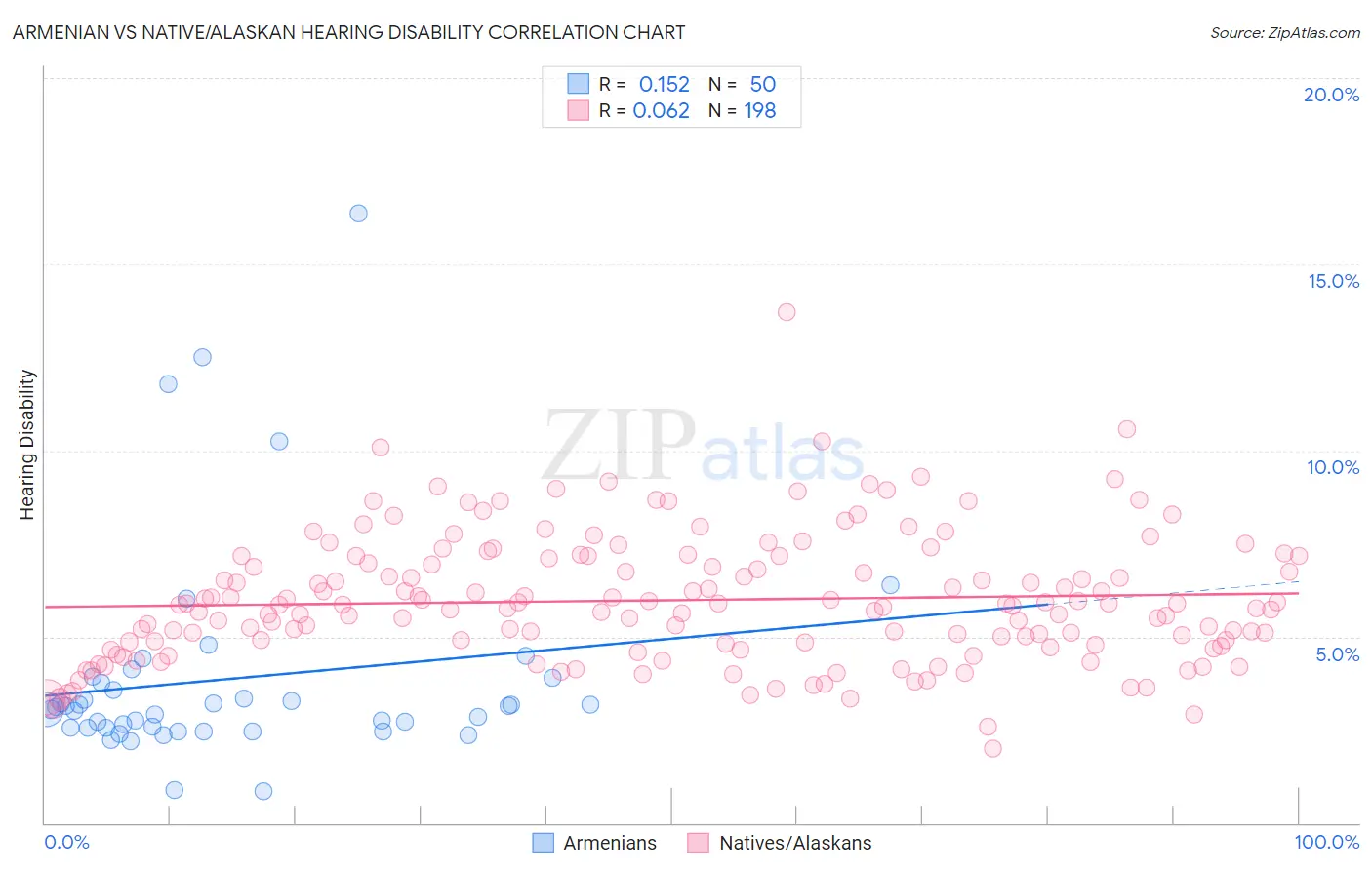Armenian vs Native/Alaskan Hearing Disability
COMPARE
Armenian
Native/Alaskan
Hearing Disability
Hearing Disability Comparison
Armenians
Natives/Alaskans
3.0%
HEARING DISABILITY
56.0/ 100
METRIC RATING
172nd/ 347
METRIC RANK
4.2%
HEARING DISABILITY
0.0/ 100
METRIC RATING
330th/ 347
METRIC RANK
Armenian vs Native/Alaskan Hearing Disability Correlation Chart
The statistical analysis conducted on geographies consisting of 310,889,694 people shows a poor positive correlation between the proportion of Armenians and percentage of population with hearing disability in the United States with a correlation coefficient (R) of 0.152 and weighted average of 3.0%. Similarly, the statistical analysis conducted on geographies consisting of 512,663,343 people shows a slight positive correlation between the proportion of Natives/Alaskans and percentage of population with hearing disability in the United States with a correlation coefficient (R) of 0.062 and weighted average of 4.2%, a difference of 41.0%.

Hearing Disability Correlation Summary
| Measurement | Armenian | Native/Alaskan |
| Minimum | 0.86% | 2.0% |
| Maximum | 16.4% | 13.7% |
| Range | 15.5% | 11.7% |
| Mean | 3.9% | 6.0% |
| Median | 3.1% | 5.9% |
| Interquartile 25% (IQ1) | 2.6% | 4.8% |
| Interquartile 75% (IQ3) | 3.8% | 7.2% |
| Interquartile Range (IQR) | 1.2% | 2.3% |
| Standard Deviation (Sample) | 2.9% | 1.7% |
| Standard Deviation (Population) | 2.9% | 1.7% |
Similar Demographics by Hearing Disability
Demographics Similar to Armenians by Hearing Disability
In terms of hearing disability, the demographic groups most similar to Armenians are Immigrants from Ukraine (3.0%, a difference of 0.060%), Immigrants from Cabo Verde (3.0%, a difference of 0.090%), Arab (3.0%, a difference of 0.15%), Immigrants from Greece (3.0%, a difference of 0.18%), and Immigrants from Eastern Europe (3.0%, a difference of 0.20%).
| Demographics | Rating | Rank | Hearing Disability |
| Immigrants | Zimbabwe | 64.2 /100 | #165 | Good 3.0% |
| Immigrants | South Eastern Asia | 62.9 /100 | #166 | Good 3.0% |
| Immigrants | Eastern Europe | 58.1 /100 | #167 | Average 3.0% |
| Immigrants | Greece | 57.9 /100 | #168 | Average 3.0% |
| Arabs | 57.6 /100 | #169 | Average 3.0% |
| Immigrants | Cabo Verde | 56.9 /100 | #170 | Average 3.0% |
| Immigrants | Ukraine | 56.6 /100 | #171 | Average 3.0% |
| Armenians | 56.0 /100 | #172 | Average 3.0% |
| Immigrants | Serbia | 51.1 /100 | #173 | Average 3.0% |
| Indonesians | 50.0 /100 | #174 | Average 3.0% |
| Immigrants | Romania | 48.4 /100 | #175 | Average 3.0% |
| Panamanians | 47.0 /100 | #176 | Average 3.0% |
| Immigrants | Philippines | 46.4 /100 | #177 | Average 3.0% |
| Japanese | 46.0 /100 | #178 | Average 3.0% |
| Immigrants | Moldova | 43.1 /100 | #179 | Average 3.0% |
Demographics Similar to Natives/Alaskans by Hearing Disability
In terms of hearing disability, the demographic groups most similar to Natives/Alaskans are Cherokee (4.2%, a difference of 0.15%), Crow (4.2%, a difference of 0.79%), Tohono O'odham (4.2%, a difference of 0.80%), Houma (4.2%, a difference of 0.83%), and Arapaho (4.1%, a difference of 1.2%).
| Demographics | Rating | Rank | Hearing Disability |
| Apache | 0.0 /100 | #323 | Tragic 4.1% |
| Osage | 0.0 /100 | #324 | Tragic 4.1% |
| Lumbee | 0.0 /100 | #325 | Tragic 4.1% |
| Potawatomi | 0.0 /100 | #326 | Tragic 4.1% |
| Arapaho | 0.0 /100 | #327 | Tragic 4.1% |
| Tohono O'odham | 0.0 /100 | #328 | Tragic 4.2% |
| Crow | 0.0 /100 | #329 | Tragic 4.2% |
| Natives/Alaskans | 0.0 /100 | #330 | Tragic 4.2% |
| Cherokee | 0.0 /100 | #331 | Tragic 4.2% |
| Houma | 0.0 /100 | #332 | Tragic 4.2% |
| Dutch West Indians | 0.0 /100 | #333 | Tragic 4.3% |
| Aleuts | 0.0 /100 | #334 | Tragic 4.3% |
| Kiowa | 0.0 /100 | #335 | Tragic 4.3% |
| Creek | 0.0 /100 | #336 | Tragic 4.4% |
| Chickasaw | 0.0 /100 | #337 | Tragic 4.5% |